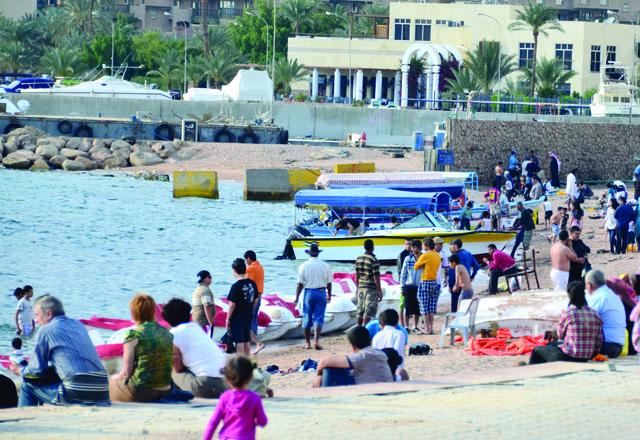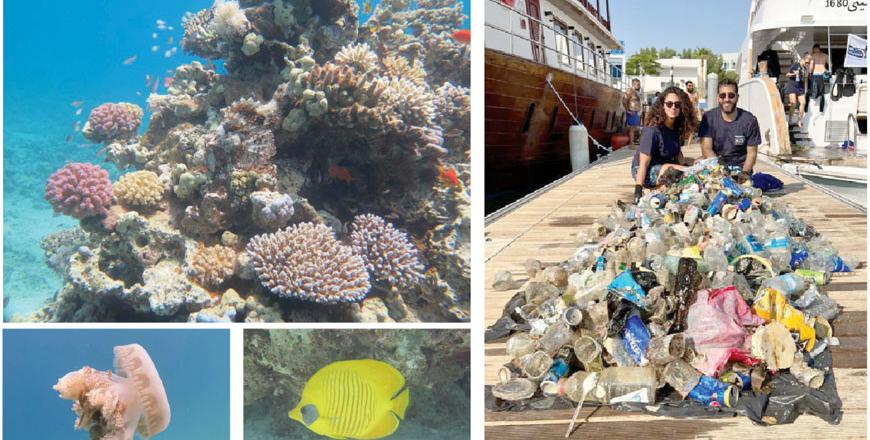You are here
Environmentalists announce rejection of planned fish farms in Aqaba
By Hana Namrouqa - Mar 04,2014 - Last updated at Mar 04,2014

AMMAN — Environmental activists on Tuesday expressed their “absolute rejection” of plans to establish fish farms in Aqaba, warning against their adverse impact on marine life and coral reefs.
The Jordanian Federation for Environmental NGOs said that although two high-level committees at the Aqaba Special Economic Zone Authority (ASEZA) ruled against the project due to its negative impact on the marine life, ASEZA is still pressing ahead with the project.
A private engineering and construction company, chaired by a current parliamentarian, is planning to establish the project in the Aqaba Marine Park, according to the federation, an umbrella for eight of the Kingdom’s environmental NGOs.
“ASEZA formed two specialised committees comprising experts in marine life and biodiversity to study the project. Both committees came up with the same result, which is rejecting the project altogether,” Israa Atturk, chairwoman of the federation, said at a press conference to announce its stand against the venture.
Atturk told reporters that ASEZA currently plans to refer the project for an environmental impact assessment “in preparation for its implementation”.
“Carrying out an environmental impact assessment for the fish farms project after two high-level specialised committees disapproved it is flagrant disregard for local and international laws protecting the environment and conventions to which Jordan is signatory,” Atturk added.
The federation on Tuesday sent a letter to Environment Minister Taher Shakhshir, in which they briefed him about the project and its impact on the marine environment.
The federation also urged the minister to “take strict and precautionary measures to prevent the implementation of this dangerous and highly sensitive project” and to protect what is left of Aqaba’s coastline that is open to the public.
The fish farms are projected to be established in the Aqaba Marine Park, a nature reserve located 15 kilometres from downtown Aqaba, according to Atturk.
The government declared the seven-kilometre beach located along the southern coastline of the port city as a marine park in 1997 with the aim of protecting the marine environment from rising pollution resulting from the rapid growth of Aqaba’s population and expansion in its industrial activities, according to the park’s website.
Faisal Abu Sondos, executive director of the Royal Marine Conservation Society of Jordan (JREDS), noted that the project will deprive Aqaba residents and visitors of the last remaining beach in the Red Sea resort that is open to the public.
“Aqaba’s coastline is 27-kilometres long. Our studies show that 22 kilometres… are occupied by ports, investments and private beaches, and only five kilometres is open to the public,” Abu Sondos said during the press conference.
The marine life conservationist warned that the project will also damage Aqaba’s reputation as one of the world’s diving destinations as the fish farms will have a negative impact on the coral reef, adding that this will in turn affect socio-economic conditions in Jordan’s only sea port.
“Marine life will suffer degradation, which will affect the fish population and coral reefs, thus affecting the socio-economic conditions of fishermen and owners of glass boats,” he pointed out.
Abu Sondos said proposals for similar fish farm investments in Aqaba have been refused in the past because of their impact on aquatic life and coral reefs. He noted that Jordan had objected to fish farms in Eilat, located on Israel’s side of the Gulf of Aqaba, and they were removed.
Related Articles
One to two square kilometres of Aqaba’s public beaches are lost every year to investment projects, according to marine conservationists.
The Environment Ministry has rejected a project to establish fish farms in Aqaba due to its negative impact on marine life, according to a senior government official.
Aqaba reefs face substantial dangers of man-made variety, mainly overfishing, litteringAround 44% of coral species recorded in Red Sea only



















